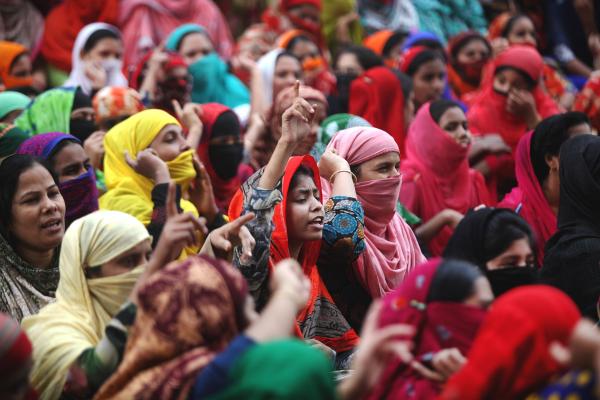I came to the U.S. as a tourist without permission to work or study; there was nothing much for me to do besides worrying about the situation. For my parents, with all of their children abroad, it was more challenging. It was 16 months before getting my “Green card,” and resumption of international travel allowed me to see my parents once again.
When I visited my parents at the end of June 2021, the Delta variant was spreading rapidly in our neighbor, India. It began to spread within a short time in our home, Bangladesh. Wearing a mask was not common; correctly doing so was less so. To reduce the spread and alert people, the government declared a new lockdown, which was relaxed in mid-July to celebrate the Eid ul-Adha, the Muslim festival of sacrifice.
Eid ul-Adha is a celebration of sacrifice to the word of God – honoring the prophet Ibrahim’s willingness to obey God’s command by sacrificing his son. Muslims go to the Mosque to pray and greet each other. Later, friends and families join to have a nice meal together and enjoy the day. Because of the risk of transmitting COVID-19, we were afraid to join any family gathering or go for prayer at the Mosque. We exchanged Eid greeting virtually with friends and families.
As my parents and I were fully vaccinated with the Pfizer or Moderna vaccines, the last thing I expected was to find all of us infected by coronavirus just after Eid.
Background
Bangladesh was among the most impacted countries by COVID-19 cases in August 2021. At that time, 50% of the infections and 44% COVID-19 related deaths were caused by the Delta variant based on genome sequencing. At its peak, there were 200 daily deaths.
The crowds at the cattle markets in Dhaka and across the country swelled as Eid celebrations got underway, increasing the risk of transmission. Although the vaccination campaign was underway, vaccine shortages and uncertainties complicated the situation. The high occupancy rate at hospitals made it challenging to handle the situation.
Crisis to get the proper care
My father needed hospitalization as his fever did not drop, while his need for additional oxygen increased. My brother’s in-laws arranged for an oxygen supply machine for my father while we waited for a hospital bed. He was feeling weak and needed continuous oxygen support, making admission urgent.
Hospitals were overwhelmed with patients requiring care. My brothers, working remotely from afar, found an available hospital bed after some struggle, but not all that close. That, too, was problematic as the constant heavy traffic congestion impeded our progress - it took 2 hours to go from my home to the hospital; usually, it takes 45 minutes. I was worried, thinking what would happen if we could not reach the hospital on time. Finally, we were able to do so.
Still, after hospitalization, it was not easy to get services. Although the hospital has a good reputation, some people were reluctant to provide support in the COVID units, fearing for their safety and creating labor shortages.
Meanwhile, my mother also fell ill. We admitted my mother to the same hospital as my father to get proper care at the same time. I used to go there every day to see if they were getting adequate care and if they needed any support. It was about 3-4 hours of daily round-trip travel; sometimes, I slept in the car because I was tired and recovering from COVID-19 myself. In Bangladesh, like in other developing countries, family members need to continuously stay with their sick relatives to ensure they get necessary hospital care.
My mother was discharged but required readmission because of complications. With type 2 diabetes, my father had long been on oral medications. But he had to start taking insulin injections as his blood glucose remained high due to the COVID-19 treatment drugs. Hyper and hypoglycemic conditions were regular issues for him. It took several months to move beyond insulin injections and return to his regular medicines.
This health crisis affected my parents physically and caused significant mental distress and anxiety. Even after recovery from this devastating coronavirus, they were afraid, unable to return to their previous life. I extended my stay in Bangladesh, and my younger brother visited them from Australia to provide physical and emotional support.
My family was lucky, having their extended family able and willing to provide support. But with their children away, working outside the country, they depend on domestic workers to help them in everyday household chores. These domestic workers have low and irregular incomes – many work in several households to provide for themselves. Because of COVID-19, many people lost their jobs because families like my parents restricted the number of people to whom they were exposed. Working for only one or two families is not enough for these people to bear the cost of living in Dhaka city. This situation caused them to leave the city for their home villages. Not only did this decrease the labor supply and make the elderly feel more helpless, but it also exacerbated the rapid spread of the virus as the domestic workers returned to their villages.
Lessons learned
- We all recovered
- I found helpful people to go through all the hospital arrangements. Time is crucial
- You always have to be prepared to face any challenges
- You need financial stability to get the proper care
Some private agencies did a great job in this challenging situation by offering 24-hour nurses at home /at the hospital to take care of my parents. This is very helpful, especially when you are sick and cannot look after others properly. Although vaccines could not prevent the coronavirus, they lowered the impact. Our relatives from abroad provided support day and night; without that, it would not have been possible for me alone to go through this journey of the COVID-19 crisis.




